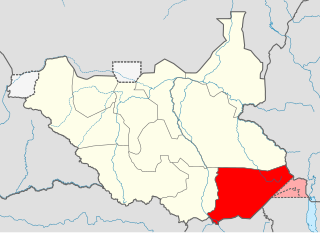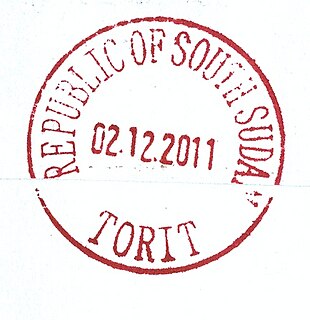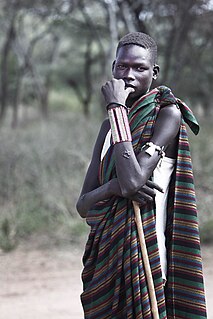Related Research Articles

Eastern Equatoria is a state in South Sudan. It has an area of 73,472 km². The capital is Torit. On October 1, 1972, the state was divided into Imatong and Namorunyang states and was re-established by a peace agreement signed on 22 February 2020.

Torit is a city of Eastern Equatoria State in South Sudan.

The Toposa are an ethnic group in South Sudan, living in the Greater Kapoeta region of the erstwhile Eastern Equatoria state. They have traditionally lived by herding cattle, sheep and goats, and in the past were involved in the ivory trade. They have a tradition of constant low-level warfare, usually cattle raids, against their neighbors.
The Otuho people, also known as the Lotuko or Latuka, are a Nilotic ethnic group whose traditional home is the Eastern Equatoria state of South Sudan. some of their villages are Oronyo, Oudo, Angario, Tirangore, Hiyala, Obira, Abalua, illieu, Ifwotu, Imurok, Iyire, Lofiriha, Offi, Oming, Oguruny, illoli, Murahatiha, chalamini, Burung, Haforiere, Tuhubak, Oriaju, Olianga, Hidonge are some of the Otuho villages. They speak the Otuho language.

Kapoeta is a town in South Sudan. It is located in Kapoeta South County, in Eastern Equatoria State, in southeastern South Sudan.

Torit County is an administrative region in Eastern Equatoria of South Sudan, with headquarters in the town of Torit, which is also the state capital.
Lafon is a county in Eastern Equatoria State of South Sudan. The largest town is Lafon.
Budi County is an administrative area of Eastern Equatoria state in South Sudan, with headquarters in Chukudum.

Greater Kapoeta is the name given to the eastern half of the erstwhile Eastern Equatoria State in South Sudan, at one time an administrative region with headquarters in the town of Kapoeta. Greater Kapoeta was divided between Kapoeta County and Budi County, named after the Buya and Didinga (BU-DI) people. Kapoeta County was later split into Kapoeta North, South and East counties.
Louis Lobong Lojore is a South Sudanese Politician and a military governor in the rank of brigadier general in the South Sudan People's Defence Forces (SSPDF) and the current governor of Eastern Equatoria State in South Sudan. He was the governor of Eastern Equatoria state from 2010-2015, governor of Kapoeta State from 2015-2020, and has been the governor of the recreated Eastern Equatoria state since 29 June 2020. Lobong is the longest serving governor in South Sudan.

Kapoeta South County is an administrative region in Eastern Equatoria State. The county logo is a ram with horns and slightly bent tail. The county includes the Kapoeta Town, Machi and Namorunyang Payams.
The government of Eastern Equatoria from 2010 took office in Eastern Equatoria State of South Sudan in June 2010 following nationwide elections in April 2010. On 9 June 2010 the Governor, Brigadier General Louis Lobong Lojore, named his ministers and the County Commissioners. Nartisio Loluke Manir was appointed Deputy Governor.
Narus is a community in the Eastern Equatoria of South Sudan. It is the headquarters of Kapoeta East County.
Nadapal is a community in the south west of Kapoeta East County, South Sudan near the border with the Rift Valley province of Kenya. The Nadapal belt is an area stretching 25 kilometres (16 mi) southward from the border with South Sudan to Lokichogio in Kenya.

Kapoeta East County is an administrative region of Eastern Equatoria state in South Sudan, bordered by Kenya to the south, Ethiopia to the east and Jonglei state to the west. It is part of the Greater Kapoeta region of the state. The largest ethnic group is the Toposa people. The principal town is Narus. The county includes the disputed Ilemi triangle, controlled by Kenya. The emblem of the county is a horned bull, with big humps and a large tail.
Lolim is a community located in Eastern Equatoria state of South Sudan. It is on the road from Kapoeta to Narus. Lolim lies just north of the Loyuro River, which has a pool called Lolimi. The community is mainly made up of Toposa people.

Kapoeta North County is an administrative division of Eastern Equatoria. The principal settlement is Riwoto and the largest ethnic group are the Toposa people. The county emblem is an elephant.
Kolnyang is a Payam in Bor County, in Jonglei State, South Sudan. It is situated on the east side of the Bahr al Jabal River, to the south of Bor, South Sudan. Kolnyang’s Malual-Chaat was where the liberation revolution that led to South Sudan independence started. Both 105 Battalion commander Alier NhialMangardit and the first fallen hero of revolt Maker Jool were from Kolnyang. Kolnyang Payam is Bor county’s southernmost payam, bordering Central Equatoria State to southwest, Pibor Administrative Area to the east, Lake State to the west and Eastern Equatoria State to the southeast.

Imatong State was a state in South Sudan that existed between 2 October 2015 and 22 February 2020. It was located in the Equatoria region and it bordered Yei River to the southwest, Jubek to the west, Terekeka and Jonglei to the northwest, Boma to the northeast, Namorunyang to the east, and Uganda to the south.

Kapoeta State was a state in South Sudan that existed between 2 October 2015 and 22 February 2020. It was located in the Equatoria region and it bordered Imatong to the west, Boma to the north, Ethiopia to the east, and Kenya and Uganda to the south.
References
- ↑ Peter Lokale Nakimangole (9 June 2010). "E. Equatoria State Ministers And County Commissioners Named". Gurtong. Retrieved 27 July 2011.
- ↑ Isaac Vuni (12 August 2007). "Eastern Equatoria official pledges to end insecurity problems". Sudan Tribune. Retrieved 27 July 2011.
- ↑ "Eastern Equatoria citizens in need of Kapoeta hospital services". Miraya FM. 2 October 2008. Archived from the original on 26 July 2011. Retrieved 27 July 2011.
{{cite web}}: CS1 maint: unfit URL (link) - ↑ Isaiah Lucheli (6 January 2010). "Boundary dispute that's an embarrassment to Kenya". The Standard. Kenya. Retrieved 27 July 2011.
- ↑ Peter Lokale Nakimangole (5 June 2011). "Over 4,000 Trespassing Herds of Cattle To Leave For Jonglei". Gurtong. Retrieved 27 July 2011.
- ↑ Peter Lokale Nakimangole (15 June 2011). "Minister Urges EES To Preserve The Environment". Gurtong. Retrieved 27 July 2011.